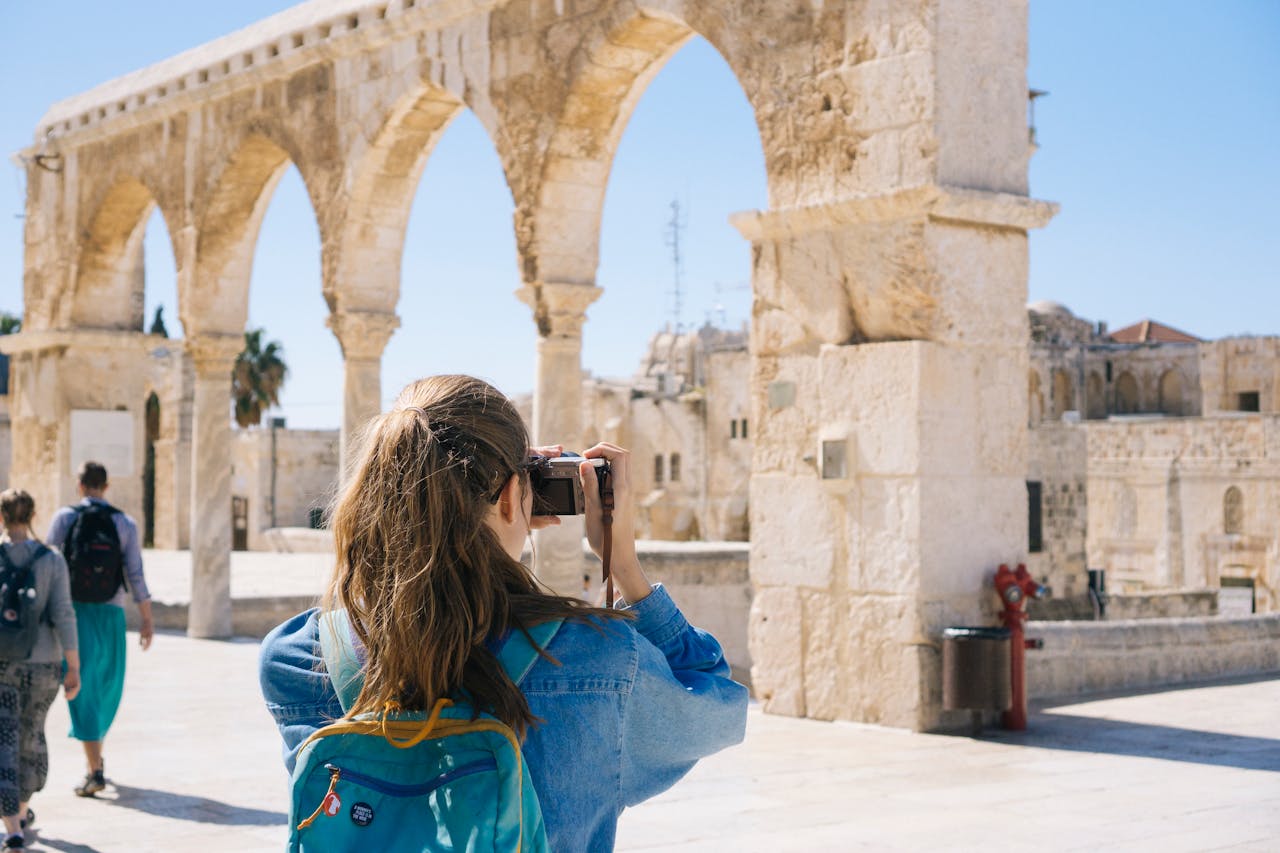Travel and adventure are not just about exploring new landscapes; they also play a crucial role in developing essential life skills.
Critical thinking in travel encourages individuals to analyze situations, make informed decisions, and reflect on their experiences.
Whether navigating unfamiliar environments or engaging with diverse cultures, travelers are often compelled to consider different perspectives and approaches.

Research and reflection are vital in the travel process.
By planning their itineraries thoughtfully, travelers can enhance their understanding of the places they visit and the people they meet.
This process not only enriches their journeys but also fosters a deeper appreciation for sustainability and responsible tourism practices.
As individuals embark on adventures, they gain insights that contribute to their personal growth and global citizenship.
Traveling with purpose can build character and competence, equipping them with skills that extend beyond the trip itself.
Key Takeaways
- Critical thinking enhances decision-making and problem-solving while traveling.
- Research and reflection improve understanding and appreciation of different cultures.
- Purposeful travel promotes personal growth and global citizenship skills.
Understanding Critical Thinking in the Context of Travel

Critical thinking is vital in travel and adventure. It helps travelers analyze experiences and decisions. This awareness leads to a richer understanding of the places they visit and promotes personal growth.
Defining Critical Thinking in Tourism
Critical thinking in tourism involves analyzing and evaluating information related to travel experiences.
It includes questioning preconceived notions about destinations and the tourism industry.
This process requires individuals to examine their biases and consider various perspectives.
For example, a traveler might assess the impact of tourism on local communities.
They should reflect on how their visit affects the environment and culture.
This deeper understanding encourages responsible travel choices, fostering a more sustainable approach to tourism.
The Importance of Criticality for Travelers
Criticality is essential for travelers to navigate complexities in today’s world.
Understanding social, political, and economic inequalities enhances their travel experiences.
When travelers engage with different cultures critically, they develop empathy and respect.
By recognizing these dynamics, travelers can promote fair practices within the tourism industry.
They are more likely to support local businesses and engage in eco-friendly activities.
This critical approach enriches their journeys, leading to more meaningful interactions.
How Tourism Analysis Enhances Travel Experiences
Tourism analysis involves examining the effects of travel on various aspects of society.
It includes economic contributions, cultural exchanges, and environmental impacts.
Through analysis, travelers can gain insights into the destinations they visit.
For instance, understanding the economic benefits of tourism can lead to informed decisions about where to spend money.
Analyzing cultural exchanges can help travelers appreciate local traditions and customs.
This knowledge enhances the overall travel experience by enabling travelers to connect more deeply with the places they visit.
By applying critical thinking and analysis, travelers can transform their adventures into enriching and responsible experiences.
The Role of Research and Reflection in Travel
Research and reflection are essential components of meaningful travel. They help travelers make informed decisions and deepen their experiences.
By applying critical approaches, one can enhance their understanding of destinations, cultures, and personal growth.
Incorporating Research for Informed Travel
Research plays a crucial role in planning a trip. It allows travelers to explore different destinations, understand local customs, and identify potential challenges.
Key areas to research include:
- Cultural Insights: Knowing the customs and traditions of a place can prevent misunderstandings and promote respect.
- Accommodations: Reading reviews helps in choosing safe and comfortable lodging.
- Local Attractions: Researching attractions ensures travelers prioritize their time effectively.
Using tools like travel blogs, guidebooks, and social media can provide firsthand accounts and tips. This approach empowers travelers to tailor their experiences and avoid common pitfalls.
Reflection and Its Impact on Travel Experiences
Reflecting on travel experiences enhances personal growth.
After a trip, individuals often process what they learned and felt.
This reflection can shape their future decisions and attitudes toward travel.
Key points of reflection include:
- Personal Growth: Travelers can assess how their experiences changed their perspectives.
- Cultural Appreciation: Reflecting on interactions with locals fosters a deeper understanding of cultural differences.
- Critical Analysis: Evaluating choices made during travel encourages better decision-making in the future.
By taking the time to reflect, travelers can better appreciate their journeys and apply insights to their everyday lives.
Planning and Itinerary Development
Effective planning and itinerary development are essential for creating successful travel experiences. This involves thinking strategically about routes, goals, and the overall travel experience while maintaining clear communication and assessing risks along the way.
Strategic Planning for Adventurous Travel
Strategic planning involves assessing the traveler’s interests and preferences. This step ensures a personalized experience that aligns with their goals.
Planners should consider elements like:
- Destinations: Select locations that offer desired activities, whether it’s hiking, cultural experiences, or relaxation.
- Timeline: Define a realistic travel schedule, allowing time for unexpected events or delays.
- Budget: Establish a budget that covers transportation, accommodations, and activities while leaving room for flexibility.
Strong communication skills are necessary during this process.
Engaging with travelers to gather information and clarifying expectations can enhance the planning experience.
Evaluating risks is also critical. Understanding environmental conditions or local safety can help avoid potential issues during the journey.
Crafting Itineraries with a Critical Perspective
When crafting itineraries, a critical perspective ensures not just a fun trip but a meaningful one. Important factors include:
- Balance: Create an itinerary that includes various activities, allowing time for rest and spontaneous experiences.
- Cultural Sensitivity: Research and respect local customs or regulations that may affect the travel experience.
- Flexibility: Build in alternative options in case plans need to change. This assists in managing unforeseen circumstances effectively.
Ultimately, the goal is to provide a well-rounded travel experience. This requires careful thought and a proactive approach to potential challenges. By focusing on these aspects, planners can develop itineraries that are exciting and enriching.
Education Theory and Travel Learning
Education theory enhances the understanding of how travel experiences can foster critical thinking and learning. Two key approaches are critical pedagogy, which emphasizes empowering learners, and a reflexive approach that encourages personal reflection during travel.
Critical Pedagogy in Travel
Critical pedagogy focuses on the role of travel in education, aiming to empower learners.
It encourages individuals to challenge societal norms and engage actively with their surroundings. This approach fosters a questioning mindset.
Travel serves as a powerful context for critical pedagogy.
By experiencing diverse cultures, learners can identify and analyze different perspectives.
Engaging with local communities helps develop social awareness and empathy.
Educational travel programs can incorporate discussions about social justice, sustainability, and cultural respect.
This way, participants gain insights into their privilege and responsibility.
The goal is not only to learn about a destination but also to understand its broader social dynamics.
Learning Through Travel: A Reflexive Approach
A reflexive approach to travel learning emphasizes reflection on experiences. It encourages individuals to think critically about what they encounter during their journeys.
This method focuses on internalizing lessons, promoting deeper understanding.
As travelers assess their interactions and observations, they begin to connect their experiences to broader concepts in tourism education.
Questions such as “What did I learn?” and “How does this relate to my life or studies?” prompt meaningful insights.
Incorporating reflective practices, like journaling or group discussions, can enrich the learning experience.
These methods allow participants to articulate their thoughts, leading to transformative learning.
The reflexive approach ensures that travel is not just about visiting new places, but also about personal growth and understanding within a global context.
Communicating and Collaborating Across Cultures
Effective communication and collaboration across cultures enhance the travel experience. They enable travelers to build meaningful connections and foster understanding. This section focuses on essential communication skills and ways to promote collaboration.
Effective Communication Skills in Diverse Settings
In a multicultural environment, clear communication is vital.
Travelers must be aware of language differences and body language.
They should strive to use simple language and be patient when speaking with those who may not share their native tongue.
Active listening is crucial. This means paying attention and showing respect for different viewpoints.
Using gestures can help convey messages without words.
Recognizing cultural norms can also aid effective communication.
For instance, some cultures value direct eye contact, while others may consider it disrespectful.
Regarding written communication, clarity is key.
Simplifying messages and avoiding jargon or idioms helps prevent misunderstandings.
Utilizing visual aids can also bridge language gaps.
When it comes to communicating across cultures, flexibility and openness are essential.
Fostering Collaboration for Cultural Exchange
Collaboration enhances cultural exchange and mutual respect.
Encouraging joint projects and shared activities can deepen understanding.
Travelers can involve local communities in discussions, thereby fostering collaboration.
This approach promotes a genuine exchange of ideas and experiences.
Establishing trust is important for effective collaboration.
It begins with showing appreciation for diverse cultures.
Engaging in community events provides opportunities to connect and collaborate.
This enhances experiences and builds lasting relationships.
Setting common goals is another vital aspect.
When collaborating, travelers should identify shared interests, making the experience enjoyable for everyone involved.
Creating opportunities for dialogue can further enrich perspectives, leading to a more meaningful travel experience.
Sustainability and Responsible Tourism
Sustainability and responsible tourism are essential elements in shaping travel experiences that benefit both travelers and local communities. These concepts focus on minimizing negative impacts while promoting the well-being of the environment and society.
Principles of Sustainable Travel
Sustainable travel emphasizes practices that protect natural resources and support local cultures. Key principles include conservation, community engagement, and minimizing waste.
- Conservation involves preserving ecosystems and wildlife. Tourists should respect natural habitats and participate in conservation efforts.
- Community Engagement means interacting positively with locals. Travelers should seek authentic experiences that promote cultural understanding and respect.
- Waste Reduction is vital. Using reusable items and participating in recycling programs helps decrease environmental footprints.
By adopting these principles, travelers contribute to a more sustainable tourism model.
Ethical Practices in Tourism Management
Ethical practices in tourism management prioritize fairness, transparency, and respect for local traditions. Tourism operators should implement guidelines that uphold these values.
- Fair Treatment of Employees ensures that workers receive fair wages and safe working conditions. This encourages job satisfaction and sustainability in the tourism sector.
- Cultural Sensitivity is crucial. Operators should educate travelers about local customs and traditions to prevent cultural erosion.
- Environmental Stewardship includes using resources wisely and supporting eco-friendly initiatives. This helps protect natural spaces and promotes sustainability.
Freedom, Creativity, and Personal Growth
Travel provides individuals with unique opportunities to experience freedom, enhance creativity, and promote personal growth. These elements are interconnected and contribute to a more enriching life.
Exploring the Concept of Freedom in Travel
Freedom in travel is about breaking away from daily routines and societal expectations.
When individuals step into new environments, they experience a sense of liberation.
This ability to explore different cultures and landscapes allows them to reflect on their own beliefs and values.
Traveling makes it possible to make spontaneous choices, like changing destinations or trying new activities.
This autonomy fosters deeper self-awareness.
Emancipation from routine can lead to significant insights about oneself and the world around them.
Harnessing Creativity Through Adventurous Experiences
Adventurous experiences can ignite creativity. Engaging in activities like hiking, climbing, or exploring unfamiliar cities challenges the mind. Such challenges encourage problem-solving and thinking outside the box.
Being in new settings stimulates the imagination. Different sights, sounds, and interactions inspire fresh ideas. Creators in various fields often find that travel fuels their projects and leads to innovative concepts. Adventure can break mental blocks and lead to artistic breakthroughs that may not occur in familiar settings.
Travel as a Means of Personal Development
Travel acts as a catalyst for personal growth. Through new experiences, individuals learn adaptability and resilience. Overcoming obstacles, such as language barriers or navigating unknown places, builds confidence.
Traveling alone, for example, can enhance independence. Many gain valuable life skills, from planning to communication. These experiences encourage introspection, helping travelers discover their passions and strengths.
This journey of exploration can lead to lasting changes in outlook and behavior, influencing their everyday lives as they return home. Each trip becomes a pivotal moment for personal change and growth.
Global Citizenship and Justice in Travel
Travel can play a significant role in shaping individuals’ perspectives on global citizenship and justice. Understanding the interconnectedness of the world can lead to more responsible travel practices and a deeper commitment to social change.
Promoting Global Citizenship through Travel
Traveling exposes individuals to diverse cultures and lifestyles. This exposure can help promote a sense of global citizenship. By engaging with local communities, travelers can learn about different social issues and cultural practices.
Participating in educational programs or volunteer opportunities abroad can enhance awareness of global challenges like poverty and inequality. Programs focused on responsible tourism encourage travelers to consider their impact on the places they visit.
Travel often inspires individuals to become advocates for justice. Engaging in conversations with locals can lead to a better understanding of the systemic issues those communities face. This newfound knowledge often fosters a motivation to promote equality and support social change.
Traveling with an Eye Towards Justice and Equality
When planning travel, it is essential to consider the ethical implications of one’s choices. This includes selecting accommodations and activities that support local economies instead of large corporations that exploit resources.
Travelers should seek out companies that prioritize fair labor practices and environmental sustainability. Visiting places that promote justice movements can provide insight into the struggles for equality in different contexts.
Acknowledging one’s privilege is crucial during travel. By understanding how citizenship and social status affect experiences, individuals can approach travel with humility and respect.
Those who travel with justice at the forefront are more likely to make thoughtful decisions that reflect a commitment to equality.
Critical Thinking in Hospitality and Service Industry
Critical thinking plays a crucial role in enhancing service delivery and innovating solutions within the hospitality sector. Employing critical theories helps professionals evaluate and improve various aspects of their business, ensuring better outcomes for both customers and the organization.
Innovative Approaches in Hospitality
The hospitality industry thrives on creativity and adaptation. To meet changing customer expectations, professionals use critical thinking to design innovative services and experiences.
For instance, case study learning allows students and employees to analyze customer interactions and case scenarios, improving problem-solving skills.
By leveraging technology, such as data analytics, businesses can assess trends and preferences. This information helps them create tailor-made experiences that enhance customer satisfaction. Training programs focused on critical thinking also contribute to better decision-making, enabling staff to address issues proactively and think outside the box in service design.
Evaluating Service Quality with a Critical Lens
Evaluating service quality requires a systematic approach. By applying critical theory, professionals can assess services from multiple perspectives, focusing on customer feedback and operational metrics.
This evaluation provides insight into strengths and weaknesses.
Tools like surveys and performance metrics help in identifying areas needing improvement. Additionally, incorporating peer reviews can lead to more comprehensive evaluations.
In this way, critical thinking fosters a culture of continuous improvement in the hospitality sector, ensuring that organizations adapt to new challenges and customer needs effectively.
Embracing Diversity and Addressing Inequality in Tourism
Diversity plays a crucial role in the travel industry, influencing how experiences are created and shared. Addressing inequality within tourism requires a focus on critical tourism studies, which analyze power dynamics and social justice.
Understanding the Role of Diversity in Travel
Diversity in travel encompasses various aspects, including cultural, racial, and socioeconomic differences. It enriches experiences by offering travelers a chance to engage with different perspectives and lifestyles.
When destinations embrace diversity, they create an inclusive environment that benefits both visitors and local communities. This approach encourages sustainable tourism practices that respect cultural heritage.
Travel companies can promote diverse experiences through tailored tours, which highlight local traditions and cuisines.
Some successful examples include culinary tours that showcase authentic dishes or festivals celebrating diverse cultures. Such initiatives not only enhance visitor engagement but also empower local economies, fostering a sense of belonging among community members.
Addressing Inequality Through Critical Tourism Studies
Critical tourism studies examine the underlying factors that contribute to inequality in the tourism sector. This field of study emphasizes the importance of understanding social, economic, and political structures that affect travel and tourism participation.
By analyzing these factors, tourism professionals can identify systemic barriers faced by marginalized groups. This knowledge helps them develop strategies to promote equity and access within the industry.
For example, policies that support diversity in hiring practices contribute to broader representation in tourism. In addition, initiatives aimed at increasing access to travel for underrepresented populations help to bridge the inequality gap.
Education and awareness are essential in critical tourism studies, as they inspire stakeholders to rethink their approaches to diversity and equity in travel.
Practical Application of Critical Thinking Skills
Critical thinking plays a vital role in enhancing travel experiences. It assists in making informed decisions and developing problem-solving skills while exploring new places. Travelers can directly apply critical thinking in various situations that arise during their journeys.
Problem-Solving Skills on the Road
When traveling, unexpected challenges often arise. These challenges can range from missed transportation to sudden changes in weather.
Travelers must evaluate their options quickly and efficiently.
For example, if a flight is canceled, a traveler may need to find alternative transportation. They might consider factors like cost, time, and available routes.
This requires quick thinking and the ability to gather relevant information. Using problem-solving skills helps in adapting to new situations, ensuring a smoother travel experience.
Critical thinking also aids in assessing risks. Travelers can weigh the pros and cons of their choices, such as engaging in adventure sports or navigating unfamiliar areas. This leads to safer and more enjoyable trips.
Critical Evaluation of Vacation Choices
Choosing the right vacation destination involves more than just selecting a picturesque location. It requires evaluating various factors, such as budget, activities, and personal preferences.
Travelers can use critical thinking to compare options. They should consider reviews, travel advisories, and even the experiences of others.
This evaluation helps set realistic expectations about what the trip will entail.
Additionally, travelers should analyze their motivations. Are they seeking relaxation, adventure, or cultural experiences?
Understanding their own desires contributes to making better choices. This approach ensures that the chosen vacation aligns with their needs and goals.
The Role of Curiosity in Travel
Curiosity drives exploration and discovery while traveling. It encourages travelers to seek out new experiences and ask questions about their surroundings.
By fostering curiosity, travelers can broaden their understanding of different cultures and places. This proactive approach invites deeper engagement with local traditions and customs.
Critical thinking complements curiosity by promoting questioning.
Travelers should ask themselves why they are drawn to a particular site or activity. This reflection can reveal insights that enhance the travel experience.
Moreover, curiosity can lead to off-the-beaten-path discoveries. When travelers remain open to new possibilities, they often stumble upon hidden gems that enrich their journey.
This mindset not only makes travel more enjoyable but also builds critical thinking skills.
Volunteering and Student Travel: A Platform for Change
Volunteering during travel offers unique opportunities for students to enhance their skills while positively impacting communities. It serves as a powerful tool for growth and career advancement.
Volunteering While Traveling: Boosting Skills and Giving Back
Volunteering while traveling allows students to gain practical experience. They can develop essential skills such as communication, problem-solving, and teamwork.
Working in diverse environments helps them adapt to different cultural contexts.
Students often engage in projects like teaching English, helping in healthcare, or conservation efforts. This hands-on work enhances their resumes and provides real-world examples of their dedication.
They also make meaningful connections with locals, deepening their understanding of global issues.
Furthermore, students learn the importance of giving back.
Contributing to the community creates a sense of accomplishment and empowers them to effect change.
This blend of skill-building and altruism makes volunteering an enriching part of their travel experience.
Student Travel as a Career Launchpad
Student travel serves as an excellent foundation for career development. Today’s employers look for candidates with international experience and adaptability.
Travel can highlight a student’s initiative and eagerness to learn.
Many students leverage their travel experiences in interviews. They can discuss challenges they faced and how they tackled them.
This demonstrates unique problem-solving abilities and global awareness, traits highly valued in diverse workplaces.
Programs like internships or volunteer work can help students explore career paths.
Exposure to different fields, such as education or environmental conservation, helps them discover passions and strengths.
This practical experience often leads to valuable networking opportunities, opening doors in their future careers.
Traveling with Purpose: Building Character and Competence
Traveling with purpose offers unique opportunities for personal growth. Engaging in challenges while exploring new places helps shape character and enhances skills.
This journey fosters both resilience and confidence, allowing individuals to navigate real-world scenarios.
Character Development Through Travel Challenges
Facing challenges while traveling encourages character development. Whether it’s navigating language barriers or solving unexpected problems, these experiences teach adaptability.
When one encounters difficulties, they learn to cope and make decisions with limited resources.
For instance, a traveler may find themselves lost in an unfamiliar city. This situation pushes them to ask for help or to find creative ways to reach their destination.
Such encounters build traits like patience and determination, which are essential life skills. Embracing these moments allows individuals to become more empathetic toward others in similar situations.
Competence and Confidence from Experiential Learning
Experiential learning is vital in gaining competence. Traveling provides hands-on experiences that classroom settings often cannot offer.
Individuals learn new skills like cooking local dishes, bartering in markets, or participating in community service projects.
These activities build confidence as travelers step out of their comfort zones.
For example, volunteering in a foreign community not only helps others but enhances one’s ability to work in diverse groups.
Developing these skills translates into better problem-solving abilities and increased self-assurance in various life contexts.
As they navigate different cultures, they gain a broader perspective and the competence needed for future challenges.
Frequently Asked Questions
Critical thinking is essential in travel, especially in adventure tourism. It helps travelers make informed decisions and assess risks effectively. Understanding common pitfalls and developing critical thinking skills can enhance any travel experience.
How can critical thinking enhance the experience of adventure tourism?
Critical thinking allows travelers to analyze their environment, assess the safety of activities, and evaluate the credibility of information sources.
By questioning assumptions and making logical deductions, they can select safer and more rewarding experiences.
What strategies can travelers adopt to assess risks in adventure travel effectively?
Travelers can start by conducting thorough research before embarking on an adventure.
This includes checking travel advisory websites, reading reviews, and consulting local experts.
They should also evaluate the risks associated with activities and listen to their instincts if something feels off.
In what ways does critical thinking contribute to making informed decisions while traveling?
By employing critical thinking, travelers can weigh options and consider consequences.
They can analyze pros and cons of different travel plans and adjust their itineraries based on real-time information.
This approach helps in avoiding tourist traps and finding authentic experiences.
What are common pitfalls or cognitive biases to avoid while planning travel and adventure activities?
Cognitive biases, such as confirmation bias or overconfidence, can distort a traveler’s perception.
It is important to remain open to new information and not rely solely on preconceived notions. Recognizing these biases can prevent poor planning and negative outcomes during the trip.
Travelers can improve their critical thinking by practicing problem-solving techniques in everyday life.
Engaging with diverse perspectives and seeking feedback from fellow travelers also helps.
Additionally, taking time to reflect on decisions made during past trips can enhance future planning.
What role does critical thinking play in understanding and respecting cultural differences while traveling?
Critical thinking fosters an appreciation for cultural diversity. It encourages travelers to question stereotypes and seek genuine interactions with locals. This mindset promotes respect and enhances cross-cultural understanding. As a result, travel becomes a more enriching experience.





